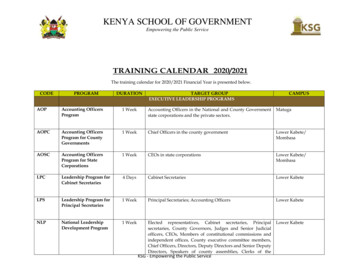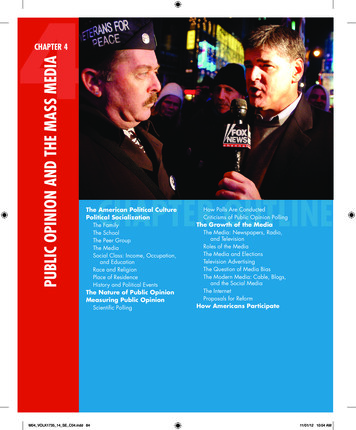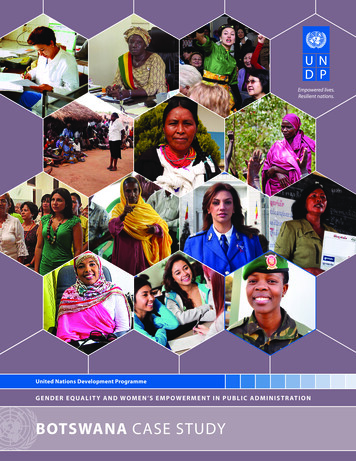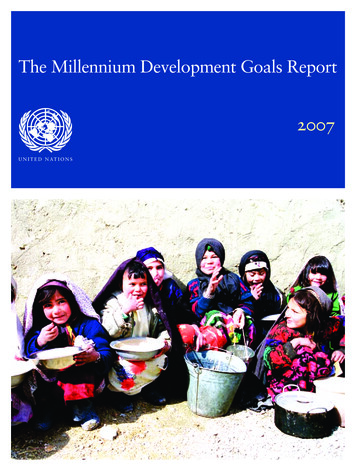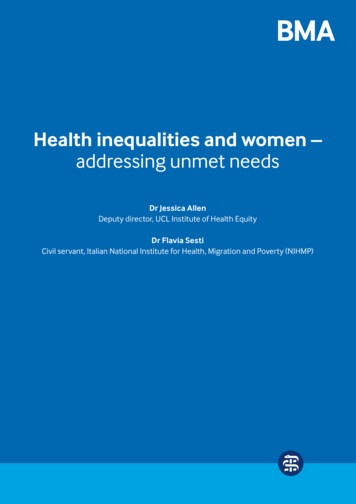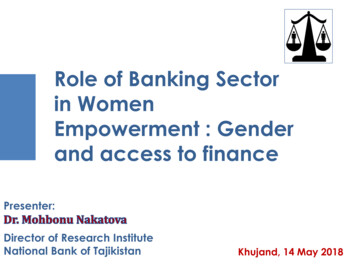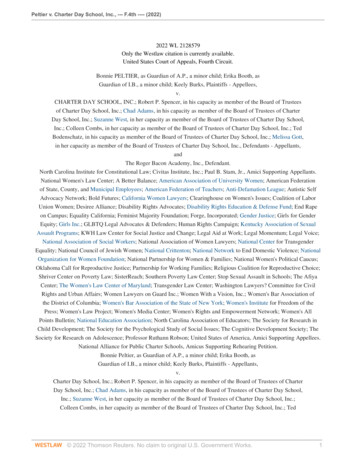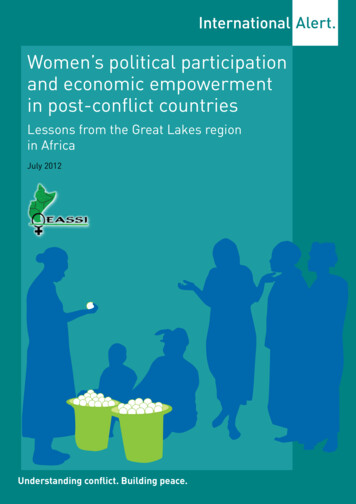
Transcription
Women’s political participationand economic empowermentin post-conflict countriesLessons from the Great Lakes regionin AfricaJuly 2012Understanding conflict. Building peace.
About International AlertInternational Alert is a 26-year old independent peacebuilding organisation. We work with people whoare directly affected by violent conflict to improve their prospects of peace. And we seek to influence thepolicies and ways of working of governments, international organisations like the UN and multinationalcompanies, to reduce conflict risk and increase the prospects of peace.We work in Africa, several parts of Asia, the South Caucasus, the Middle East and Latin America andhave recently started work in the UK. Our policy work focuses on several key themes that influenceprospects for peace and security – the economy, climate change, gender, the role of internationalinstitutions, the impact of development aid, and the effect of good and bad governance.We are one of the world’s leading peacebuilding NGOs with more than 159 staff based in London and 14field offices. To learn more about how and where we work, visit www.international-alert.org.This publication has been produced with financial support of the Swedish International DevelopmentCooperation Agency (SIDA). The contents of this document are the sole responsibility of InternationalAlert/EASSI and can under no circumstances be regarded as reflecting the position of SIDA.About EASSIThe Eastern Africa Sub-Regional Support Initiative for the Advancement of Women (EASSI) is a subregional civil society organisation established in 1996 to facilitate systematic follow up of the Platformsfor Action emanating from the Fourth World Conference on Women held in Beijing, China, in 1995. Thedevelopment of the Beijing Platforms for Action was preceded by the African Platform of Action onWomen, which was developed in Dakar, Senegal, in 1994. EASSI is a collaboration between individuals,NGOs, coalitions and networks committed to the advancement of women. It is registered in Uganda as anon-governmental organisation and currently covers eight countries in the Eastern African sub-region:Burundi, Eritrea, Ethiopia, Kenya, Rwanda, Somalia, Tanzania and Uganda.This report was produced with the assistance of the Ministry of Foreign Affairs of Norway. It is part ofa regional research project conducted thanks to the financial support of the Ministry of Foreign Affairsof Norway, the Swedish International Development Cooperation Agency (SIDA) and the Social SciencesResearch Council (SSRC) in New York. International Alert 2012All rights reserved. No part of this publication may be reproduced, stored in a retrieval system or transmitted in any form orby any means, electronic, mechanical, photocopying, recording or otherwise, without full attribution.Layout by D. R. inkFront cover image: D. R. ink
Women’s political participationand economic empowermentin post-conflict countriesLessons from the Great Lakes regionin Africa
2International AlertAcknowledgementsThis report represents a synthesis of the key findings and recommendations of a regional researchproject on women’s political participation and economic empowerment in countries emergingfrom conflicts in the Great Lakes region of Africa. The author of this report is Ndeye Sow, SeniorAdviser in the Africa programme at International Alert. She is also the coordinator of the regionalresearch project which was conducted in Burundi, Rwanda, Uganda and the Democatic Republicof Congo (DRC).The four case studies produced by this regional research project were researched and authored by:In Burundi: Dr Christophe Sebudandi, Independent Consultant and lead researcher; and VictoireNikumana, Former Member of Parliament and former Minister for the Promotion of Women’s.She has been Minister for Trade, Industry and Tourism in the Burundian government since 2010.In Rwanda: Immaculée Mukankubito, Independent Consultant, lead researcher, andJeanne d’Arc Mihigo, Independent Consultant.In Uganda: Dr Josephine Haikire, lead researcher, Dr Aramanzan Madanda, respectively AssociateProfessor and Lecturer in the School of Women and Gender Studies at Makerere Universityin Kampala; and Christine Ampaire, District Community Development Officer with MukonoDistrict Local Government.In the Democratic republic of Congo: Catherine Odimba, Lecturer at the Faculty of Political andAdministrative Sciences at the University of Kinshasa, lead researcher; Dr Paul Robain Namegabe,Professor and Dean of the Faculty of Law at the Université Catholique de Bukavu (UCB); JulienneBaseke Nzabandora, Lecturer, Department of Sociologie at the Université Officielle of Bukavu.This report was edited and translated from French to English by Benedict Du Cassé, an independantconsultant. It was reviewed by Stuart Moir, independent consultant and Phil Vernon, Director ofProgrammes at international Alert.The publication was coordinated by Chandani Thapa, Strategic Communications Manager atInternational Alert.We would like to sincerely thank our donors who funded this regional research project: theMinistry of Foreign Affairs of Norway, the Swedish International Development CooperationAgency (SIDA) and the Social Sciences Research Council (SSRC) in New York.
Women’s political participation and economic empowerment in post-conflict countriesTribute to Jeanne d’Arc MihigoJeanne d’Arc Mihigo, member of the research team in Rwanda and co-author of the Rwandancase study, died tragically in the crash of the Hewa Bora Airways flight in Kisangani, in theDemocratic Republic of Congo, in July 2011. She was 41 years old.Born to a Congolese father and a Rwandan mother, Jeanne was deeply concerned by the gravecrisis facing DRC for more than a decade. In 2009, she published, in English, a book entitled Ruraldevelopment for conflict transformation. A case study of North Kivu, in which she examined thelinkages between rural development and conflicts in the territories of Masisi and Rutshuru in theprovince of North Kivu in Eastern DRC. She concluded that the restoration of the state authority,along with the promotion of good governance, were determining factors in building sustainablepeace and lasting prosperity in DRC, in particular in the east of the country.We recall about Jeanne her great professionalism, her generosity and unstinting commitment to thereturn of peace and the promotion of women’s human rights in DRC.3
4International AlertTable of contentsExecutive summary1.Introduction6122. The involvement of women at the negotiating table:the Burundi peace talks held in Arusha and the Sun City inter-Congolese dialogue143. Assessment of the new quota system in Burundi: impact on the political representationof women204. Promoting gender equality in the decentralisation process and in local governance:the example of Rwanda265. Women in electoral processes: the 2006 presidential and legislative, national and provincialelections in the Democratic Republic of Congo326. The economic dimension of women’s political action: the role of women in buildinga peace economy in northern Uganda377.Conclusions428.Recommendations45
Women’s political participation and economic empowerment in post-conflict countriesTable of acronymsADD Association pour la défense des droits des femmes [Association for the defence of women’srights]ADEPAE Action pour le développement et la paix endogène [Action for development and endogenouspeace]ADRAlliance démocratique pour le renouveau [Democratic alliance for renewal]AFEMSK Association des femmes des médias du Sud Kivu [Association of media women in SouthKivu]CAFCO Cadre permanent de concertation de la femme congolaise [Permanent consultativeframework of Congolese women]CAFOB Collectif des associations et organisations non gouvernementales féminines du Burundi[Collective womens’ associations and NGOs in Burundi]CEDAWConvention on the Elimination of All Forms of Discrimination against WomenCNDD-FDD Conseil National pour la Défense de la Démocratie-Forces pour la Défense de de laDémocratie [National Council for the Defence of Democracy-Forces for the Defence ofDemocracy]CNFConseil national des femmes [National council of women]CSOCivil Society OrganisationDRCDemocratic Republic of CongoDYNAFEPDynamique des femmes politiques [Dynamics of woman politicians]ICDInter-Congolese DialogueINECIndependent National Electoral CommissionMIGEPROF Ministère du Genre et le Promotion de la Famille [Ministry of Gender and Family Promotion]MINALOCMinistry of Local Government, Community Development and Social AffairsMINECOFIN Ministère des Finances et de la Planification Economique [Ministry of Finance and EconomicPlanning]NRANational Resistance ArmyPRDPPeace, Recovery and Development PlanSACCOSavings and Credit CooperativeSADCSouthern African Development Community5
6International AlertExecutive summaryOne of the positive results of peace processes and political transitions in the Great Lakes region inAfrica during the last ten to fifteen years has been the representation and increased involvementof women in politics and in the public sphere. This major step forward in favour of women wasprimarily achieved thanks to the adoption of quota systems, as well as through co-optation.The constitutions adopted by Uganda, Burundi, Rwanda and the Democratic Republic of Congo(DRC) during the post-conflict transition periods include provisions which integrate femalerepresentation quotas of at least 30 percent in decision-making institutions. In DRC the constitutionadopted by referendum in December 2005 went even further by including the principle of equalrepresentation. The reconstruction of northern Uganda, following a murderous twenty-year longconflict, has provided opportunities for women, who have been playing a prominent role in theregion’s economic recovery.This report represents a synthesis of the key findings and recommendations of a regional researchproject on women’s political participation and economic empowerment in countries emergingfrom conflicts in the Great Lakes region of Africa. The research project, conducted in Burundi,Rwanda, DRC and Uganda, was undertaken jointly by International Alert and the EasternAfrica Sub-regional Support Initiative (EASSI), in partnership with some of the leading women’sorganisations in the four countries, as well as the Department of Women and Gender Studies atMakerere University in Kampala, Uganda.The research focuses on four case studies and examines the nature and quality of women’spolitical participation in the four countries to establish whether women’s increased representationin decision making at the national and local governance level has translated into the adoptionof gender equality policies and enhancement of women’s socio-economic status at all levels ofsociety. The research further analyses the economic dimension of women’s political participationby linking women’s economic empowerment and their representation in the political arena.The four case studies focused on the following specific issues: In Rwanda: the study examined and analysed the integration of gender equality into thedecentralisation process and the impact on women’s participation in national and localgovernance. The study entitled “Promouvoir l’égalité entre les sexes dans les processus dedecentralisation et la gouvernance locale: leçons du Rwanda” (Promoting gender equalityinto decentralisation processes and local governance: lessons from Rwanda) is available onInternational Alert website (http://www.international-alert.org/resources) In Burundi: the case study looked at the nature and impact of women’s participation in theArusha peace process and the impact of the quota system in promoting women in national andlocal government. The case study entitled “A la conquête de la parole. La participation desfemmes dans la transition démocratique au Burundi” (Speaking out: Women’s participationin the political transition in Burundi) can be downloaded from our website. In Uganda: the study set out to examine and understand the position of women in the peaceeconomy and politics, and the interaction between their increased economic power andtheir participation in political and public life. The title of the study is “Post-war economicopportunities in northern Uganda: implications for women’s empowerment and politicalparticipation”. It can be downloaded from the International Alert website. In DRC: the study assessed women’s participation in the inter-Congolese dialogue and the2006 general elections. The study entitled: “La participation des femmes dans les processus
Women’s political participation and economic empowerment in post-conflict countriesde paix et la prise de décision politique en République Démocratique du Congo” (Women’sparticipation in peace processes and political decision-making in the Democratic Republic ofCongo) is available on International Alert’s website.A summary of the main findings of these case studies is presented below:1. Women at the negotiating tableThe case studies on Burundi and DRC, which reviewed women’s participation in the officialpeace processes in Arusha for Burundi and in the inter-Congolese Dialogue at Sun City in SouthAfrica, concluded that, despite their low level of representation in these processes, Burundian andCongolese women nevertheless managed to have provisions for women’s rights and gender equalityincluded in the 2000 Arusha peace accord and the 2002 Global and All-inclusive Agreement forDRC. However, the wording of the principle of gender equality was kept very general, particularlyregarding women’s representation in governing political bodies. This partly explains the difficultiesand/or slowness in implementing most of these provisions. In DRC in particular, the principleof a quota of 30 percent women’s representation in state institutions, which was promised towomen in Sun City, was never enforced. Afterwards, Congolese women successfully lobbied forthe inclusion of the principle of 50-50 parity representation in the constitution adopted in 2006,but there again mechanisms for implementing parity were never adopted. In Burundi, a quota of30 percent representation for women at the highest level of governance was finally enshrined inthe constitution adopted in March 2005, five years after the signing of the Arusha peace accord.It took another four years before the quota of 30 percent representation for women was added tothe electoral code following its reform in 2009.2. Impact of quota policiesThe case study on Burundi also carried out an assessment of nearly five years of a 30 percentwomen’s representation quota in political institutions. It appears that, despite the fact that quotassignificantly increased the number of women in decision-making bodies at all levels, includinglocal governance, this did not necessarily lead to substantial and effective representation ofwomen or to significant reduction in inequalities between men and women. Women, especiallythose living in rural and peri-urban areas, continue to face major constraints such as poverty, lackof access to land and property, illiteracy and heavy domestic workloads.The adoption of a quotas system was not accompanied by a transformation of the political andinstitutional systems, which remain heavily masculine and hamper the promotion of genderequality. The combination of ethnic and regional quotas, adopted in 2005, tended to reinforceethnic and regionally-based allegiances as well as ethnic and political isolationism, pushingpoliticians, including women, into partisan positions accordingly. Nonetheless, the increasedrepresentation of women in state institutions may be having gradual positive effects on socialtransformation in Burundi. It seems that women are progressively building up self-confidence,resulting in their increased access to speech within the public sphere, as well as higher socialrespect.3. Decentralisation processes: the challenges of mainstreaming genderAs in Burundi, the quota policy implemented by the Rwandan government lead to a greaterrepresentation of women in the decentralisation process, which began in early 2000. However, theprinciple of gender equality has not been properly integrated into the process and decentralisationhas not provided a space which could have allowed women to influence the policies defined at thelocal governance level. Women continue to be under-represented in key positions related to policyand programme implementation. Furthermore, decentralised bodies lack the technical, materialand financial resources to implement a gender equality policy effectively. The lack of expertise ongender analysis and gender budgeting of technical and local counsellors has become one of themain obstacles to mainstreaming gender into planning and budgeting processes.7
8International AlertWomen are also marginalised in public participation fora, which have been designed toenable people to take part in discussions relating to development priorities and programmeimplementation. Nevertheless, issues related to gender equality are brought up in these fora,particularly violence against women, land tenure and property ownership, as well as familyplanning. The study concludes that the decentralisation process in Rwanda offers opportunitiesto close the gender gap and achieve more equality. However, this is subject to the strengtheningof decision-making powers of decentralised bodies and local communities so that they can takeownership of the decentralisation process.4. Women’s representation in electoral processesIn DRC, women were actively involved in the 2006 general elections, the first to take place inthe country in over thirty years. They made up the majority of voters, about 64 percent, for thelegislative elections. However, very few of them managed to get elected: 8 percent at the NationalAssembly and 8.6 percent in the Senate. Women were penalised by a perverted electoral system andbiases in the composition of electoral lists. They also suffered from insufficient financial means, alack of political experience and the mobilising power to build a broad and strong electoral base.The anti-democratic and conservative nature of political systems and social and religiousinstitutions in DRC hinder the effective implementation of parity, despite it being entrenchedin the constitution. Despite the adoption of some measures for women’s greater participationin political and public life, numerous provisions which discriminate against women still exist invarious laws relating to the family and women’s personal lives. The Family Code, for instance, stillsubjects married women to the guardianship of their husbands. The gender norms and stereotypeswhich structure gender relations are the major obstacles to the equal representation of women inpolitical and public life in DRC.5. Economic power and political participationPoverty and lack of economic security are often regarded as some of the major barriers towomen’s political participation. However, in northern Uganda, the advances made by women inthe economic sphere have not given them a more prominent position in political decision making.Indeed, women have played a key role in the region’s economic recovery after the war, enablingthem to increase their income significantly; however, not at a level which would allow them toachieve economic security, and break free from the cycle of economic survival and merely meetingpractical needs.In addition, development and reconstruction policies in northern Uganda have not taken intoaccount the important contribution made by women in the building of a peace economy. Despitethe commitment made by most development agencies operational on the ground to mainstreamgender into their programmes, women are still viewed as a vulnerable group instead of fullyfledged economic agents. They continue to be marginalised from the major development plans setup by the government and international development agencies at the end of the war. Furthermore,very little attention has been paid by development planners to the high levels of sexual violenceagainst women and the way in which unequal gender relations continue to affect the economicrecovery.All this explains, to a large extent, women’s poor participation in politics in northern Uganda,even though their increased income has allowed many of them to play a more central role indecision making within the household and to acquire greater mobility and influence in decisionmaking bodies in communities.
Women’s political participation and economic empowerment in post-conflict countriesRecommendationsThe four case studies identified priorities and strategic actions to strengthen the participation ofwomen in political and public life, as well as to acknowledge and support their pivotal role in theeconomic recovery of the region.The recommendations are as follows:Burundi Create a statistical database on women’s political participation; Assess progress made by Burundi in implementing its national and international commitmentstowards gender equality by using well-known gender indicators such as the African gender anddevelopment index (AGDI)1. This assessment could be carried out in collaboration between thegovernment of Burundi, relevant United Nations agencies and civil society organisations; Pass the Bill on women’s rights to inheritance and land ownership: the government andNational assembly should pass the Bill reforming the Code on inheritance, matrimonialregimes and gifts, which has been under review since 2002; Integrate effectively the principle of gender equality into national policies and developmentprogrammes: it must be ensured that the Vision 2025 and the new Poverty Reduction StrategyPaper (PRSP) actively mainstream gender. This implies:- publicising and implementing national gender policy through the establishment of structuresenvisioned by the law such as the Gender National Council;- providing structures for gender equality with enough human and financial resources toefficiently accomplish their mission;- guaranteeing that the selection of women candidates to positions of power are based on meritand “representativity” in order to overcome objections to the introduction of quotas for women. Put in place mechanisms to allow the raising of the educational level of women and girls andreduce the burden of heavy workload: thought should be given to ways of allowing womento free up time aside from household work and daily domestic chores, such as fetching waterand gathering firewood. Consideration should also be given to organising a wide functionalliteracy campaign, which would include, among others, components on political and civiceducation, the Family Code, resource management and family planning. This campaign wouldtarget both women and men; Develop and reinforce alliances and networks among women by putting in place a permanentstructure for consultation between women politicians and those from civil society. Throughthis mechanism, joint programmes highlighting women’s priorities would be developed andencourage those women elected to positions of power to commit themselves to it; E ncourage women’s political participation through specific concrete actions: develop partnershipsbetween women’s organisations and men who are sensitive and committed to gender equality(politicians, and religious, customary and civil society leaders) in order to strengthen advocacyfor women’s increased participation in political life and for gender equality; Encourage the government to respect its national, regional and international commitments onpromoting gender equality: the support of the international community is essential to enableBurundi to meet its commitments on gender equality. In that sense, respect for gender equalityshould be a criterion for eligibility for international cooperation programmes negotiatedwith the Burundian government. The international community should also support capacitybuilding for women regarding political participation and be involved in the monitoring ofgender indicators.1The AGDI, or African Gender and Development Index, is a tool which maps the extent of gender inequality in Africa and assessesgovernment performance. It consists of two parts: the qualitative Gender Status Index (GSI) and the qualitative African’s WomenProgress Scoreboard (AWPS). For further information about the AGDI see UN Economic Commission for Africa (UNECA) (2004). TheAfrican Gender and Development Index. Addis Ababa.9
10International AlertRwandaFor the Government Develop a programme to build and strengthen the capacities of decentralised entities ongender analysis and gender planning and budgeting in order to improve the extent to whichgender is taken into account in performance contracts and budgets. Methods of developingperformance contracts must include specific gender indicators in each area of planning; Develop better quantitative and qualitative indicators allowing the measurement of changesin gender equality at the individual, institutional and community level; Provide decentralised entities with gender experts to ensure that gender analysis is integratedat all stages of the decentralisation process; Support the districts in the production of development plans, taking into account the genderdimension and develop partnerships with stakeholders who work in decentralisation in orderto influence the inclusion of gender in their planning; Include analysis of obstacles which communities face in the monitoring of public action inregular evaluations of the decentralisation process, especially with regard to gender, to enablethe initiation of strategies to reduce these obstacles. Strengthen the capacity of Ministry of Gender staff in charge of gender issues in the districts,so they become more capable of supporting and supervising gender mainstreaming in theplans and budgets of decentralised entities; Support critical thinking and analysis designed to identify strategies and programmes to reducewomen’s heavy workload and provide support for women who work in decision-makingbodies in decentralised entities (taking into account the obstacles to their participation). Theseanalyses should influence the planning and budgeting of development actions on the part ofdecentralised entities and central government; Create a continuous education and awareness programme for local communities on genderequality to reduce resistance to change and support progress. The programme should alsoinclude discussions with families about educating their daughters to the highest possible level.For the National Council of Women (NCW) and other civil society organisations Redefine the role of NCW agents in the districts to allow cooperation and synergy with otherunits in districts, sectors and cells; Support the local chapters of the NCW in decentralised entities to develop strategies to take partin decentralised governance processes, particularly in influencing participation mechanisms tobetter take gender equality issues into account; Collaborate on or advocate for education programmes on leadership and other activitieswhich strengthen the capacities of women in decision-making positions or candidates forthese positions. Encourage and facilitate networking between women leaders in decentralised entities to helpthem further their analysis on the obstacles to women’s participation and conduct advocacywith relevant authorities.For the Rwandan Association of Local Government Authorities (RALGA) Become involved in projects which promote gender equality in local government (such asPAGOR) and capitalise on gains so that other districts can also benefit from them; Initiate a network of women leaders in decentralised entities to help them examine moredeeply the obstacles to women’s participation and lobby the relevant decision-making bodies.
Women’s political participation and economic empowerment in post-conflict countriesDemocratic Republic of Congo (DRC) Establish inclusive and representative political structures by increasing and strengtheningwomen’s presence in central state and customary/community institutions and structures, aswell as political parties. This would imply the adoption and effective implementation of thelaw on parity and the subsequent reform of the electoral code; Develop and strengthen the political socialisation of women and transform the politicalbehaviours of both women and men by mainstreaming gender into the various agents ofsocialisation, particularly in schools, mass media and religious institutions; Make the link between the local and global level by bringing together state actors, women’sorganisations, local communities and wider civil society around a common ideal: working topromote women’s participation in a context of national reconstruction.Northern Uganda Make gender a core element in the design and implementation of economic recoveryprogrammes in northern Uganda; Ensure strategic institutional development for women: this requires extensive mobilisationof women, to train them on contracts and awards and to increase their capacity to formcompanies and joint ventures; Promote a political culture within women’s groups and train women on how to effectivelyparticipate at various levels and form political alliances and coalitions across parties; Mobilise men and boys to reconstruct positive masculinities, and involve them in actions toprevent and respond to violence against women. There is also an urgent need to bring menback into household provisioning and sustenance.11
12International Alert1. IntroductionDespite their devastating nature, the conflicts which have affected the Great Lakes region haveintroduced a measure of fluidity into the traditional social order, which has allowed the creation ofspaces dedicated to expression and political action, of which w
crisis facing DRC for more than a decade. In 2009, she published, in English, a book entitled Rural development for conflict transformation. A case study of North Kivu, in which she examined the linkages between rural development and conflicts in the territories of Masisi and Rutshuru in the province of North Kivu in Eastern DRC.


